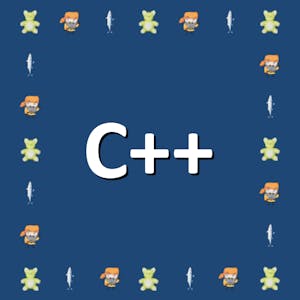C++ Class Development
About this Course
This course is the third course in the specialization about learning how to develop video games using the C++ programming language and the Unreal game engine on Windows or Mac. This course assumes you have the prerequisite knowledge from the previous two courses in the specialization. You should make sure you have that knowledge, either by taking those previous courses or from personal experience, before tackling this course. Throughout this course you\'ll continue building your foundational C++ and Unreal knowledge by exploring more C++ and Unreal topics. Module 1: Learn how abstraction helps us develop good software and design and implement console app classes Module 2: Explore how functions really work \"under the covers\" Module 3: Design and implement Unreal classes and include them in a game. Discover how strings work in both C++ and in an Unreal HUD Module4: Expand your understanding of pointers and add sound effects to an Unreal gameCreated by: University of Colorado System

Related Online Courses
In this course, learn how Python was built in C and, by extension, languages like Java and JavaScript. Review object-oriented programming syntax from several languages and use your knowledge of C... more
Ask the right questions, manipulate data sets, and create visualizations to communicate results.\\n\\nThis Specialization covers foundational data science tools and techniques, including getting,... more
According to internetlivestats.com, there are over 1.58 billion websites of which 200 million are active websites. This number is constantly growing with most businesses leaning towards building... more
Introducing the Java FullStack Developer Specialization, designed to empower your software development career by providing a comprehensive skillset for building integrated, cloud-ready web... more
This Specialization from leading researchers at the University of Washington introduces you to the exciting, high-demand field of Machine Learning. Through a series of practical case studies, you... more








